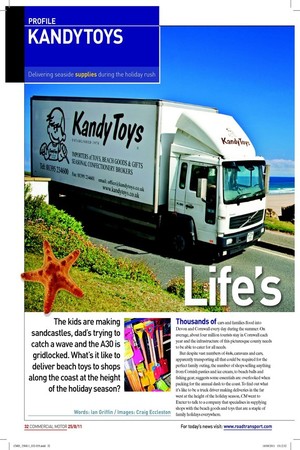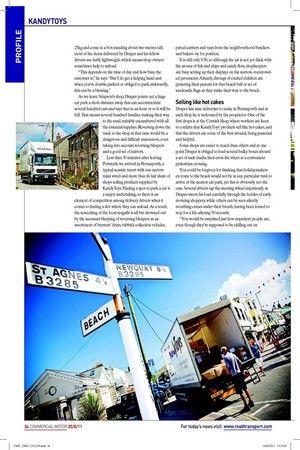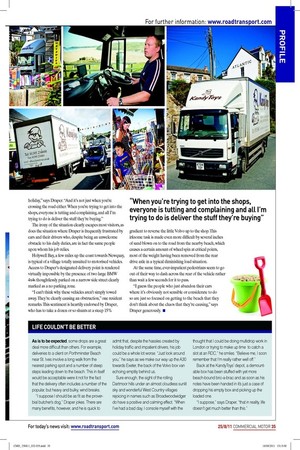e’s
Page 27

Page 28

Page 29

Page 30

If you've noticed an error in this article please click here to report it so we can fix it.
Thousands of cars and families lood into Devon and Cornwall every day during the summer. On average, about four million tourists stay in Cornwall each year and the infrastructure of this picturesque county needs to be able to cater for all needs.
But despite vast numbers of 4x4s, caravans and cars, apparently transporting all that could be required for the perfect family outing, the number of shops selling anything from Cornish pasties and ice cream, to beach balls and ishing gear, suggests some essentials are overlooked when packing for the annual dash to the coast. To ind out what it’s like to be a truck driver making deliveries in the far west at the height of the holiday season, CM went to Exeter to talk to a company that specialises in supplying shops with the beach goods and toys that are a staple of family holidays everywhere. “Our business is directly affected by the weather, as you can imagine,” says Howard Whaley, operations manager for KandyToys. “When the sun is shining, our customers are lat out. But down here this situation changes from day to day.” It’s not hard to understand why weather patterns affect the fortunes of KandyToys. The irm supplies everything from the iconic plastic bucket and spade, to ishing nets, postcards and sticks of rock; everything that is displayed outside a typical seaside shop.
The company was founded more than 30 years ago and initially handled the sale and distribution of sweets and chocolate. Today, it sells more than 2,000 product lines and employs 50 workers, four of them full-time drivers charged with ensuring that every child entering the West Country is guaranteed to get the bucket and spade of their choice.
Mark Draper is one of these drivers and, having been with KandyToys for more than 20 years, has a good understanding of the seasonal nature of the business. He can be allocated any one of the leet’s four Volvo rigids, which are selected for different runs. On the morning CM catches up with him, he’s checking over a 12-tonne gross FL220 itted with a Ray-Smith demountable body system.
“The number of drops we have and where they are dictates the size of the truck I get and what time I leave the yard,” he says. “Today I’ve got a dozen drops and there’s no point in getting to the irst one in Portreath [about 20 miles from Land’s End] until 8.30am because the shop doesn’t open until then.” Portreath, near Redruth, is a two-and-a-half hour drive from the depot at Clyst St Mary, so at exactly 6am Draper pulls his Volvo box-van out of the KandyToys yard and heads off down the M5 for a few miles before branching on to the A30 for the run into Cornwall.
It’s clear Draper is looking forward to the day ahead. He started with KandyToys after leaving school and spent time working in the warehouse before becoming a driver.
Dealing with heavy traffic
KandyToys supplies customers across a region stretching from Land’s End in the West to Southampton, although most deliveries take place in the area to the west of Weston-Super-Mare. Consequently, Draper’s knowledge of the ‘local’ geography is exceptionally good.
Trafic is getting heavy when we leave the A30 and head down the narrow B3300 towards Portreath at about 8.15. At this stage the roads take on all the characteristics one associates with Devon and Cornwall, with high banks, overhanging trees and sharp corners. It’s easy to understand why operators making multi-drop deliveries are often forced into using short wheelbase, highly manoeuvrable vehicles such as the Volvo FL.
In Portreath we have to reverse several hundred yards down an unmade track to the beach for the irst drop of the day. Even at this early hour, a tanker driver is already discharging a load of heating oil into a tank at the premises of an adjacent restaurant.
Shop owner Linsey Simpson arrives and explains that, although trade is seasonal, there is a living to be made selling plastic ‘bits and bobs’. Her shop is crammed with items designed to keep kids happy and parents that little bit poorer, although none of the items could be considered big budget purchases.
With the exception of the KandyToys’ wind breaks, which weigh in at around 25kg and come in a box standing about two metres tall, most of the items delivered by Draper and his fellow drivers are fairly lightweight, which means shop owners sometimes help to unload.
“This depends on the time of day and how busy the customer is,” he says. “But I do get a helping hand and when you’re double-parked or obliged to park awkwardly, this can be a blessing.” As we leave Simpson’s shop, Draper points out a huge car park a short distance away that can accommodate several hundred cars and says that in an hour or so it will be full. That means several hundred families making their way to the sand, suitably encumbered with all the essential supplies. Reversing down the track to the shop at that time would be a dangerous and dificult manoeuvre, even taking into account reversing bleepers and a good set of mirrors.
Less than 30 minutes after leaving Portreath we arrived in Perranporth, a typical seaside resort with one narrow main street and more than its fair share of shops selling products supplied by KandyToys. Finding a spot to park a car is a major undertaking, so there is an element of competition among delivery drivers when it comes to inding a slot where they can unload. As a result, the screeching of the local seagulls is all but drowned out by the incessant bleeping of reversing bleepers as an assortment of brewers’ drays, rubbish collection vehicles, parcel carriers and vans from the neighbourhood butchers and bakers vie for position.
It is still only 9.30, so although the air is not yet thick with the aroma of ish and chips and candy loss, shopkeepers are busy setting up their displays on the narrow, overcrowded pavements. Already, throngs of excited children are pestering their parents for that beach ball or set of sandcastle lags as they make their way to the beach.
Selling like hot cakes
Draper has nine deliveries to make in Perranporth and at each shop he is welcomed by the proprietor. One of the irst drops is at the Cornish Shop, where workers are keen to conirm that KandyToys’ products sell like hot cakes, and that the drivers are some of the best around, being punctual and helpful.
Some shops are easier to reach than others and at one point Draper is obliged to load several bulky boxes aboard a set of sack trucks, then cross the street at a convenient pedestrian crossing.
You could be forgiven for thinking that holidaymakers en route to the beach would not be in any particular rush to arrive at the nearest car park, yet this is obviously not the case. Several drivers tap the steering wheel impatiently as Draper steers his load carefully through the hordes of early morning shoppers, while others can be seen silently mouthing curses under their breath, having been forced to stop for a life-altering 30 seconds.
“You would be surprised just how impatient people are, even though they’re supposed to be chilling out on holiday,” says Draper. “And it’s not just when you’re crossing the road either. When you’re trying to get into the shops, everyone is tutting and complaining, and all I’m trying to do is deliver the stuff they’re buying.” The irony of the situation clearly escapes most visitors, as does the situation where Draper is frequently frustrated by cars and their drivers who, despite being an unwelcome obstacle to his daily duties, are in fact the same people upon whom his job relies.
Holywell Bay, a few miles up the coast towards Newquay, is typical of a village totally unsuited to motorised vehicles. Access to Draper’s designated delivery point is rendered virtually impossible by the presence of two large BMW 4x4s thoughtlessly parked on a narrow side street clearly marked as a no parking zone.
“I can’t think why these vehicles aren’t simply towed away. They’re clearly causing an obstruction,” one resident remarks. This sentiment is heartily endorsed by Draper, who has to take a dozen or so shunts at a steep 15% gradient to reverse the little Volvo up to the shop. This irksome task is made even more dificult by several inches of sand blown on to the road from the nearby beach, which causes a certain amount of wheel spin at critical points, most of the weight having been removed from the rear drive axle in a typical diminishing load situation.
At the same time, ever-impatient pedestrians seem to go out of their way to dash across the rear of the vehicle rather than wait a few seconds for it to pass.
“I guess the people who just abandon their cars where it’s obviously not sensible or considerate to do so are just so focused on getting to the beach that they don’t think about the chaos that they’re causing,” says Draper generously. ■














































